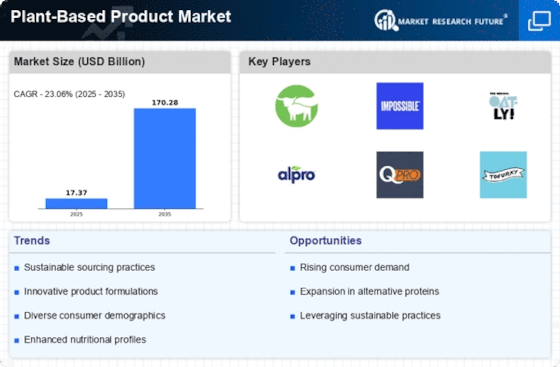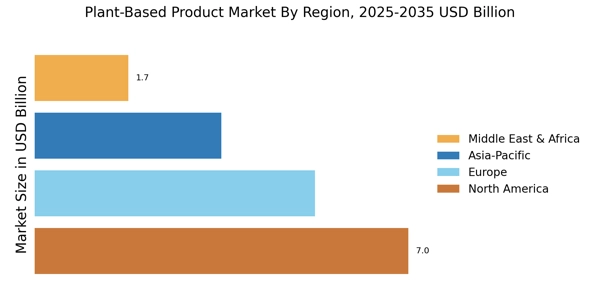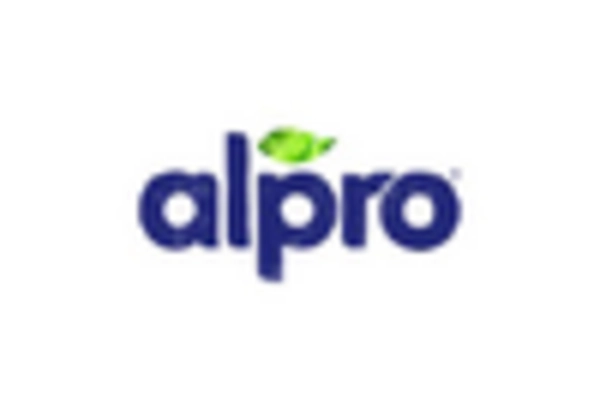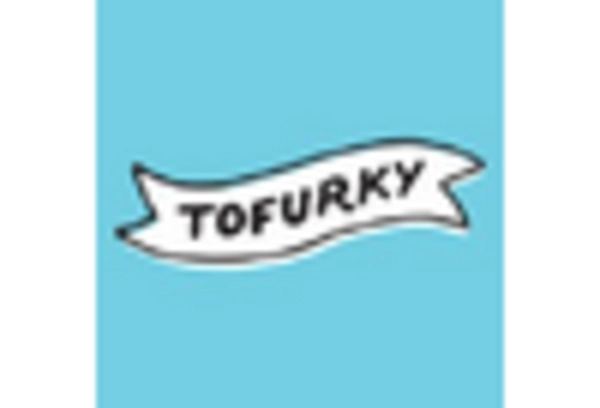Health and Nutritional Awareness
The Plant-Based Product Market is increasingly shaped by rising health and nutritional awareness among consumers. As individuals become more informed about the benefits of plant-based diets, they are more inclined to incorporate these products into their daily lives. Studies indicate that plant-based diets are associated with lower risks of chronic diseases, such as heart disease and diabetes. This growing recognition of the health benefits associated with plant-based eating is driving demand for products that promote well-being. The Plant-Based Product Market is thus witnessing a shift towards healthier options, with consumers actively seeking products that are not only plant-based but also rich in nutrients. Companies that effectively communicate the health advantages of their offerings are likely to resonate with health-conscious consumers, further propelling market growth.
Innovative Product Offerings and Variety
Innovation plays a crucial role in the growth of the Plant-Based Product Market. The introduction of new and diverse product offerings has captured the attention of consumers, who are eager for variety in their diets. Recent market analysis indicates that the plant-based food sector has expanded to include a wide range of products, from meat substitutes to dairy alternatives, catering to various tastes and preferences. This diversification not only attracts new consumers but also encourages existing customers to explore different options within the Plant-Based Product Market. Companies that invest in research and development to create innovative and appealing products are likely to thrive in this competitive landscape. The continuous evolution of product formulations and flavors is essential for maintaining consumer interest and driving market growth.
Environmental Concerns and Sustainability
The Plant-Based Product Market is significantly influenced by heightened environmental concerns among consumers. As awareness of climate change and its impact on the planet grows, many individuals are seeking sustainable food options. Research suggests that plant-based diets can reduce greenhouse gas emissions by up to 50% compared to meat-based diets. This realization has led to a shift in consumer preferences, with a substantial portion of the population prioritizing sustainability in their purchasing decisions. The Plant-Based Product Market is thus positioned to benefit from this trend, as consumers increasingly favor products that align with their values regarding environmental stewardship. Companies that emphasize sustainable sourcing and eco-friendly practices are likely to gain a competitive edge in this evolving market landscape.
Regulatory Support and Policy Initiatives
The Plant-Based Product Market is benefiting from increasing regulatory support and favorable policy initiatives aimed at promoting sustainable food systems. Governments are recognizing the importance of plant-based diets in addressing public health and environmental challenges. Recent policy developments indicate a trend towards supporting plant-based food production through subsidies and incentives. This regulatory environment is conducive to the growth of the Plant-Based Product Market, as it encourages investment and innovation in plant-based food technologies. Additionally, educational campaigns aimed at promoting plant-based diets are gaining traction, further enhancing consumer awareness and acceptance. As policymakers continue to advocate for sustainable food practices, the Plant-Based Product Market is likely to experience accelerated growth and increased legitimacy in the broader food landscape.
Rising Consumer Demand for Plant-Based Products
The Plant-Based Product Market is experiencing a notable surge in consumer demand, driven by a growing awareness of health and wellness. Recent data indicates that approximately 60% of consumers are actively seeking plant-based alternatives to traditional animal products. This shift is not merely a trend; it reflects a fundamental change in dietary preferences, with many individuals opting for plant-based diets to enhance their overall health. The increasing prevalence of lifestyle-related diseases has prompted consumers to reconsider their food choices, thereby propelling the growth of the Plant-Based Product Market. Furthermore, the rise of social media and influencer culture has amplified the visibility of plant-based diets, encouraging more individuals to explore these options. As a result, manufacturers are responding by expanding their product lines to cater to this burgeoning demand.

















